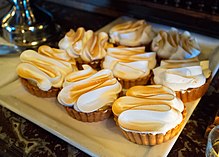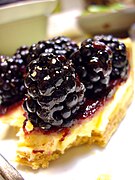LIMSpec Wiki
Contents
 Raspberry tart | |
| Main ingredients | Pastry crust (usually shortcrust pastry) |
|---|---|
| Variations | Sweet tarts, savoury tarts |
A tart is a baked dish consisting of a filling over a pastry base with an open top not covered with pastry. The pastry is usually shortcrust pastry; the filling may be sweet or savoury, though modern tarts are usually fruit-based, sometimes with custard. Tartlet refers to a miniature tart; an example would be egg tarts. The categories of "tart", "flan", and "pie" overlap, with no sharp distinctions.
History

The French word tarte can be translated to mean either pie or tart, as both are mainly the same except a pie usually covers the filling in pastry, while flans and tarts leave it open.[1]
Tarts are thought to have either come from a tradition of layering food or to be a product of Medieval pie making. Enriched dough (i.e. shortcrust) is thought to have been first commonly used in 1550, approximately 200 years after pies. In this period, they were viewed as high-cuisine, popular with nobility, in contrast to the view of a commoner's pie. While originally savory, with meat fillings, culinary tastes led to sweet tarts prevailing, filling tarts instead with fruit and custard.[2] Early medieval tarts generally had meat fillings, but later ones were often based on fruit and custard.[3]
An early tart was the Italian crostata, dating to at least the mid-15th century. It has been described as a "rustic free-form version of an open fruit tart".[4]
Description

Tarts are typically free-standing with firm pastry base consisting of dough, itself made of flour, thick filling, and perpendicular sides while pies may have softer pastry, looser filling, and sloped sides, necessitating service from the pie plate.[5][6][7]
Varieties
There are many types of tarts, with popular varieties including Treacle tart, meringue tart, tarte tatin and Bakewell tart. A jam tart uses jam in place of fresh fruit.
Tarte Tatin is an upside-down tart, of apples, other fruit, or onions.
Savoury tarts include quiche, a family of savoury tarts with a mostly custard filling; German Zwiebelkuchen and Alsace Tarte à l'oignon or Zewelwaï[8] (onion tarts), and Swiss cheese tart made from Gruyère.
Gallery
-
Strawberry tart
-
Chocolate tart
-
Mexican blackberry tart
-
Cranberry curd tart
-
Tarte fruits rouges
See also
Notes
- ^ Davidson: s.v. 'tart'
- ^ "Tarts, a History". Joe Pastry. 20 July 2009. Retrieved 19 September 2016.
- ^ Davidson: s.v. 'tart'
- ^ Corley: 2011. Page 129.
- ^ "Pie or Tart: What's the Difference". Retrieved 2015-03-15.
- ^ "Pie vs. Tart: What's the Difference?". Retrieved 2015-03-15.
- ^ "About Tarts". iFood.tv. Retrieved 19 September 2016.
- ^ David, pp. 184–185
References
- Corley, Dinah (2011). Gourmet Gifts: 100 Delicious Recipes for Every Occasion to Make Yourself & Wrap with Style. Houghton Mifflin Harcourt. ISBN 9781558324350.
- David, Elizabeth (2008) [1960]. French Provincial Cooking. London: Folio Society. OCLC 809349711.
- Davidson, Alan (1999). The Oxford Companion to Food. Oxford: Oxford University Press. ISBN 978-0-19-211579-9.
External links
 Media related to Tarts at Wikimedia Commons
Media related to Tarts at Wikimedia Commons


























